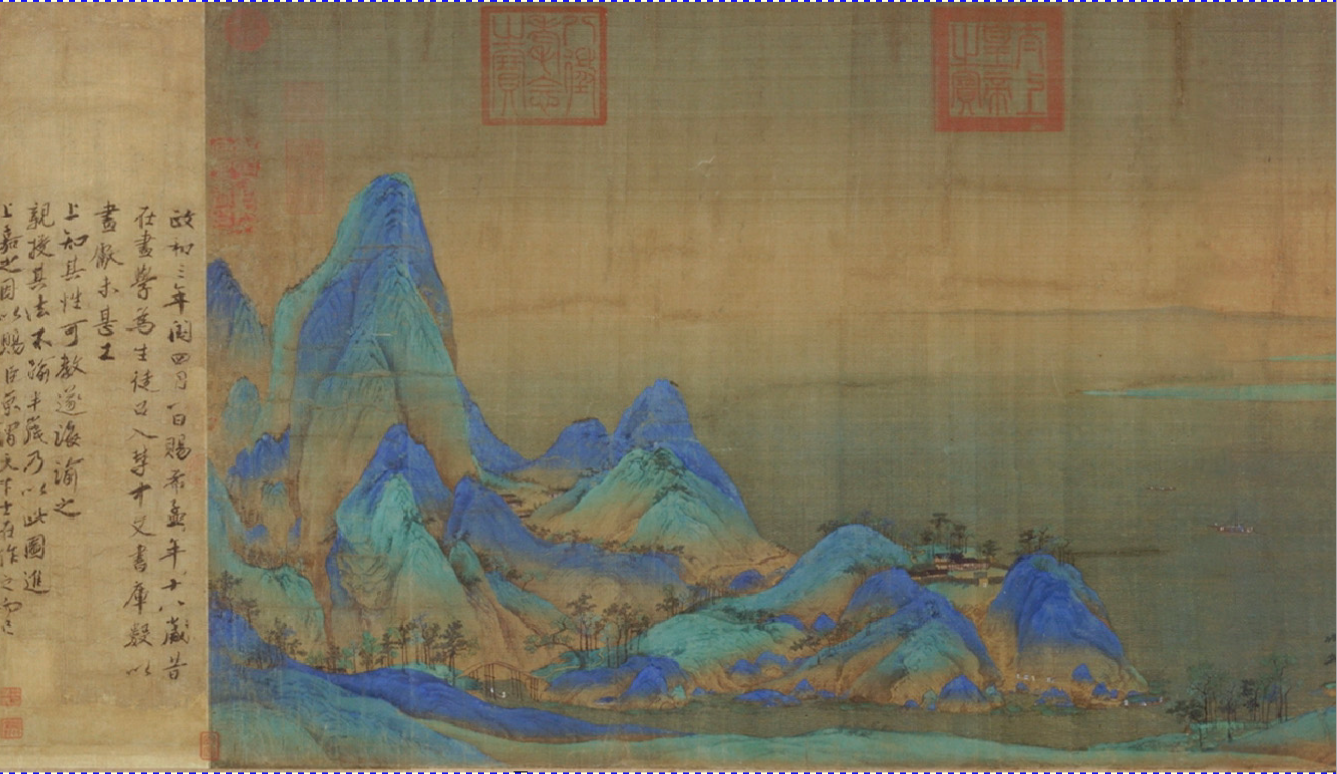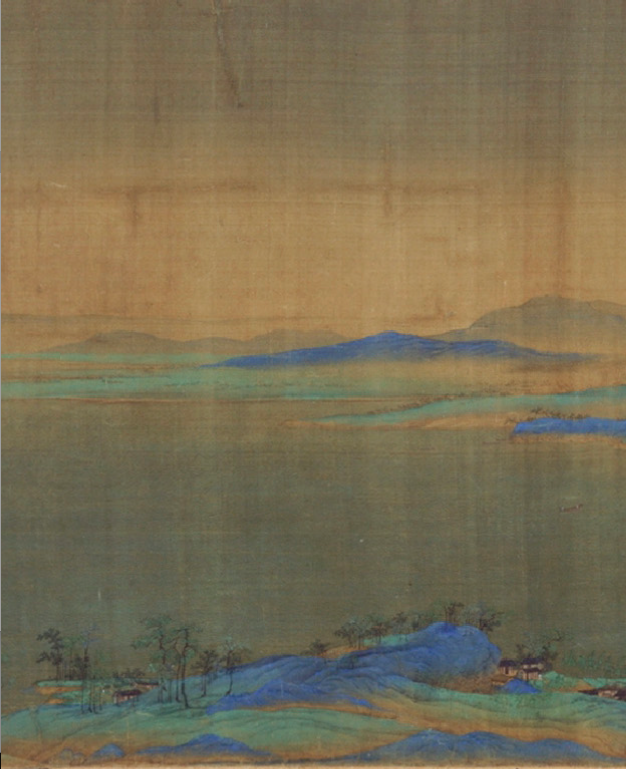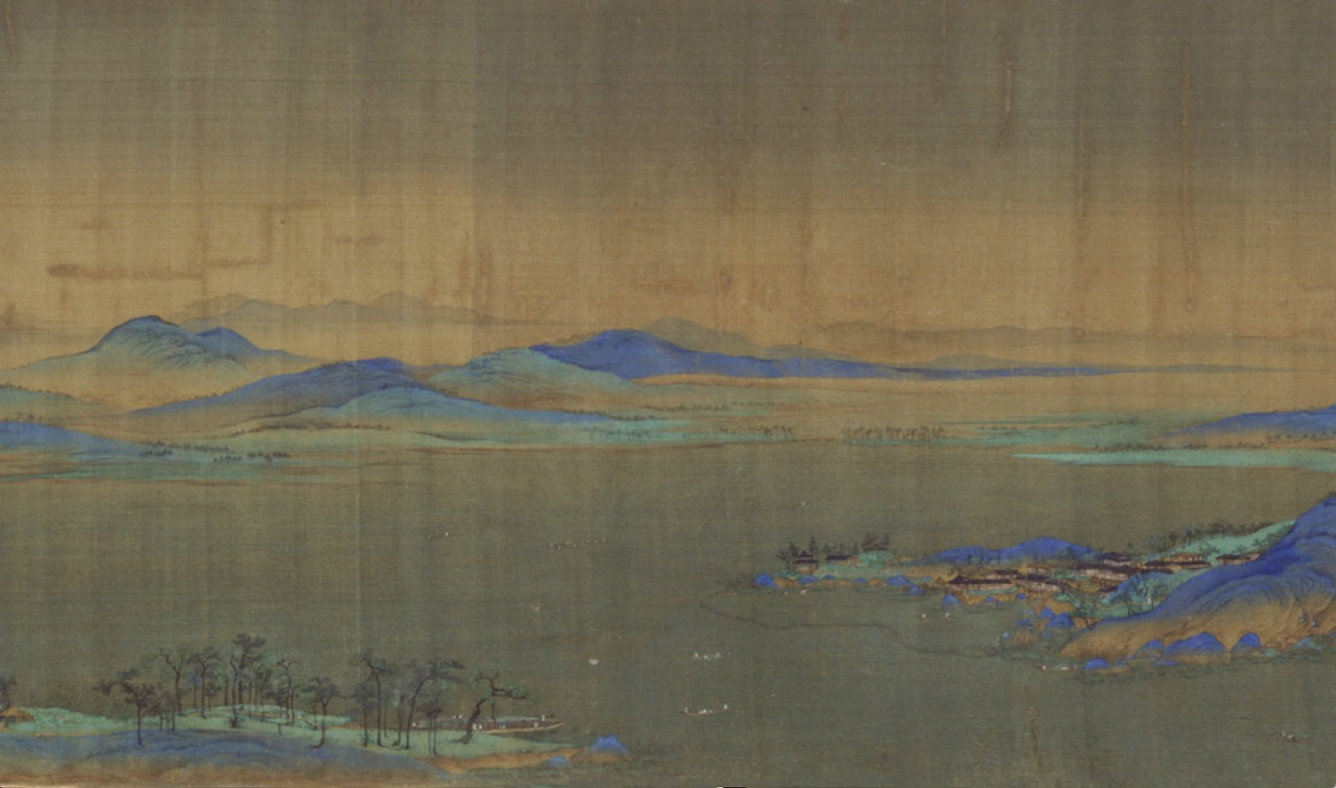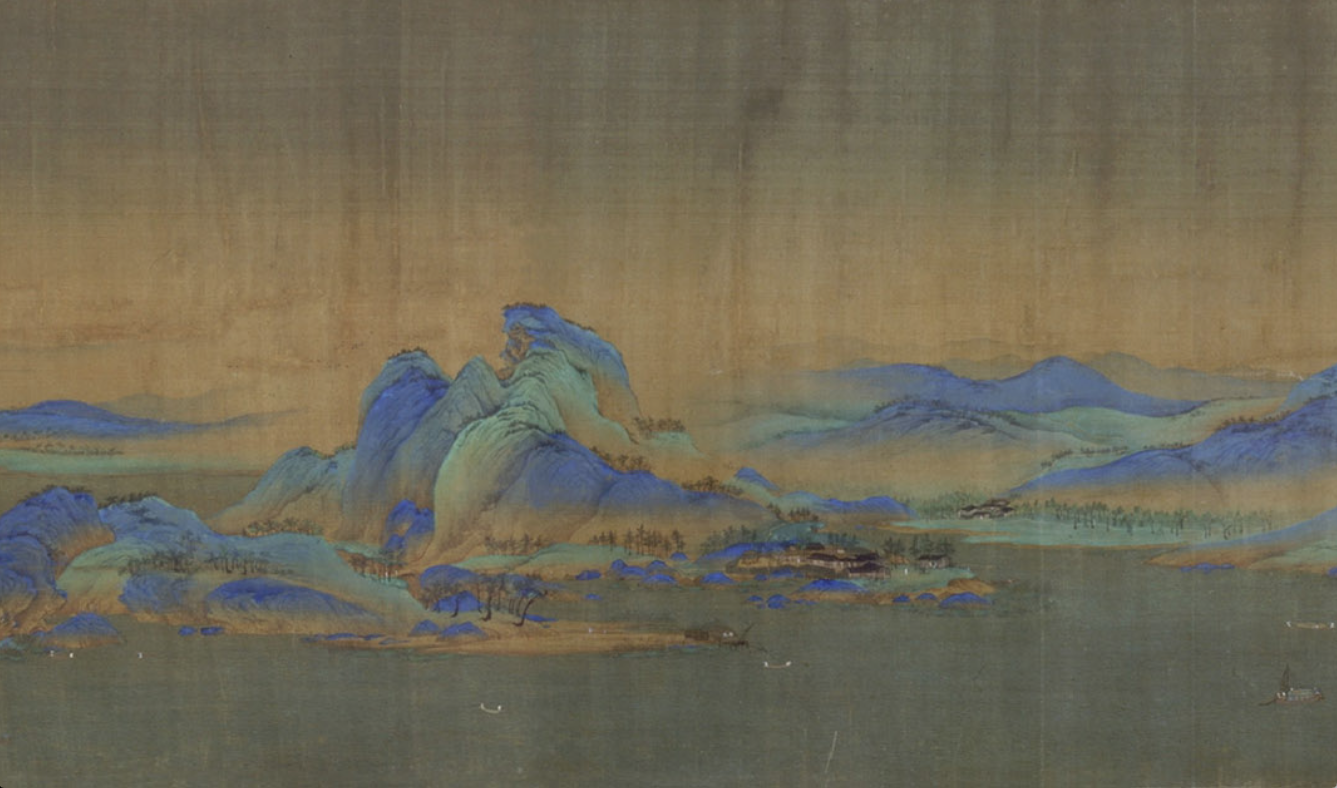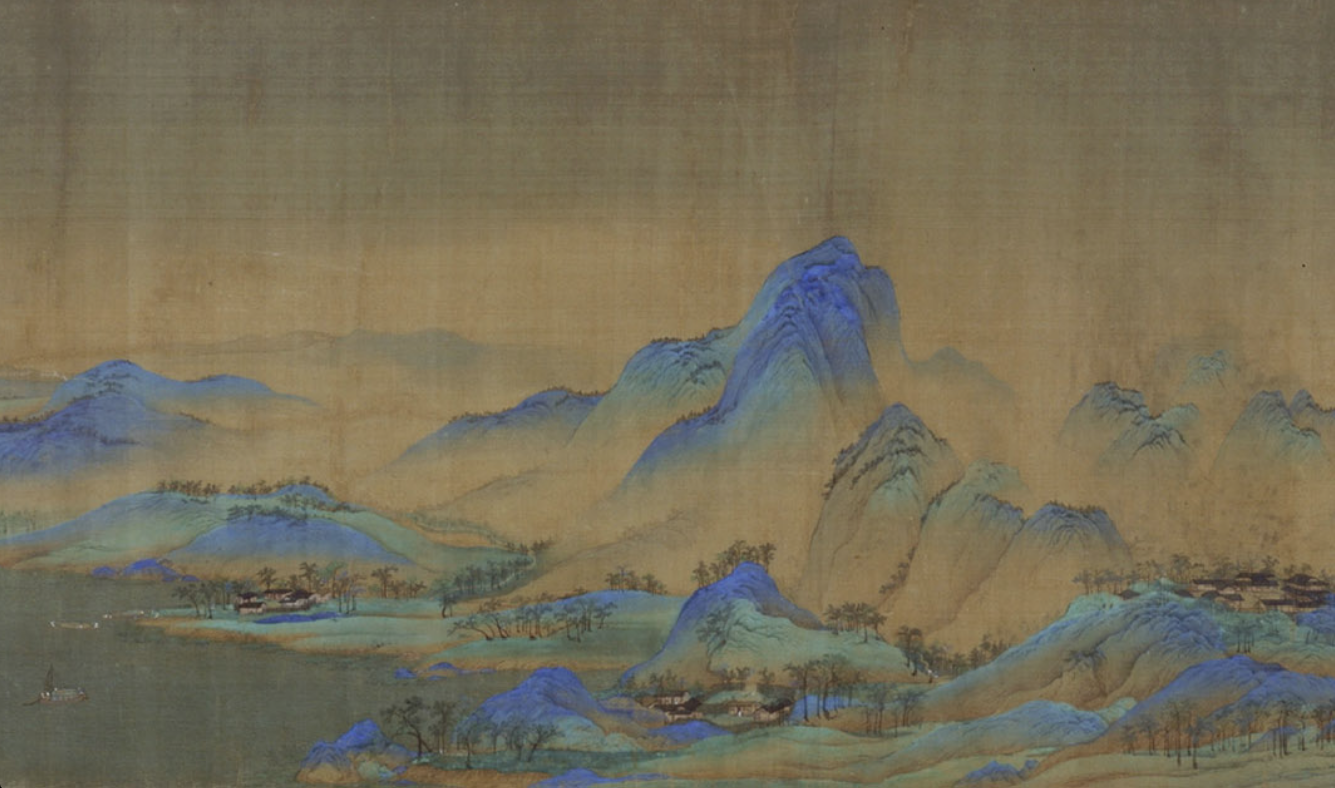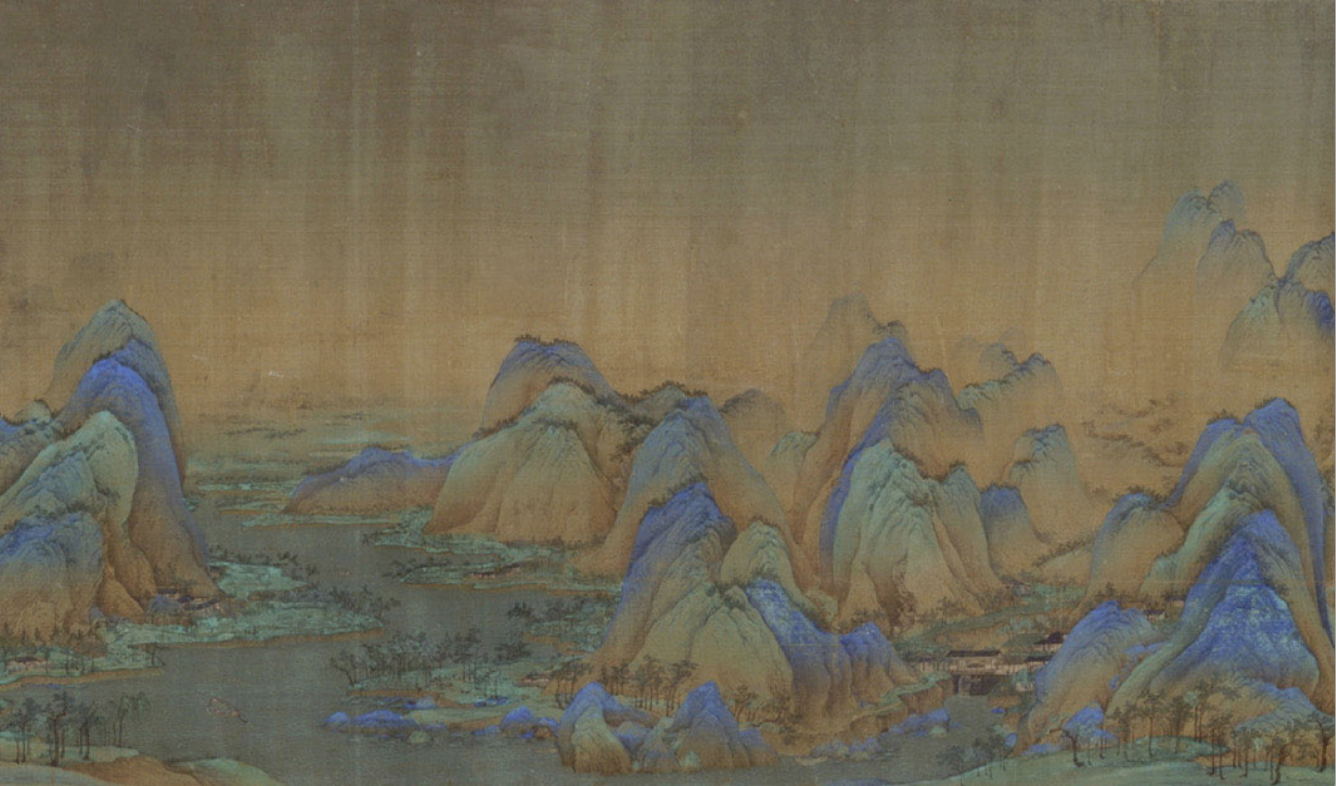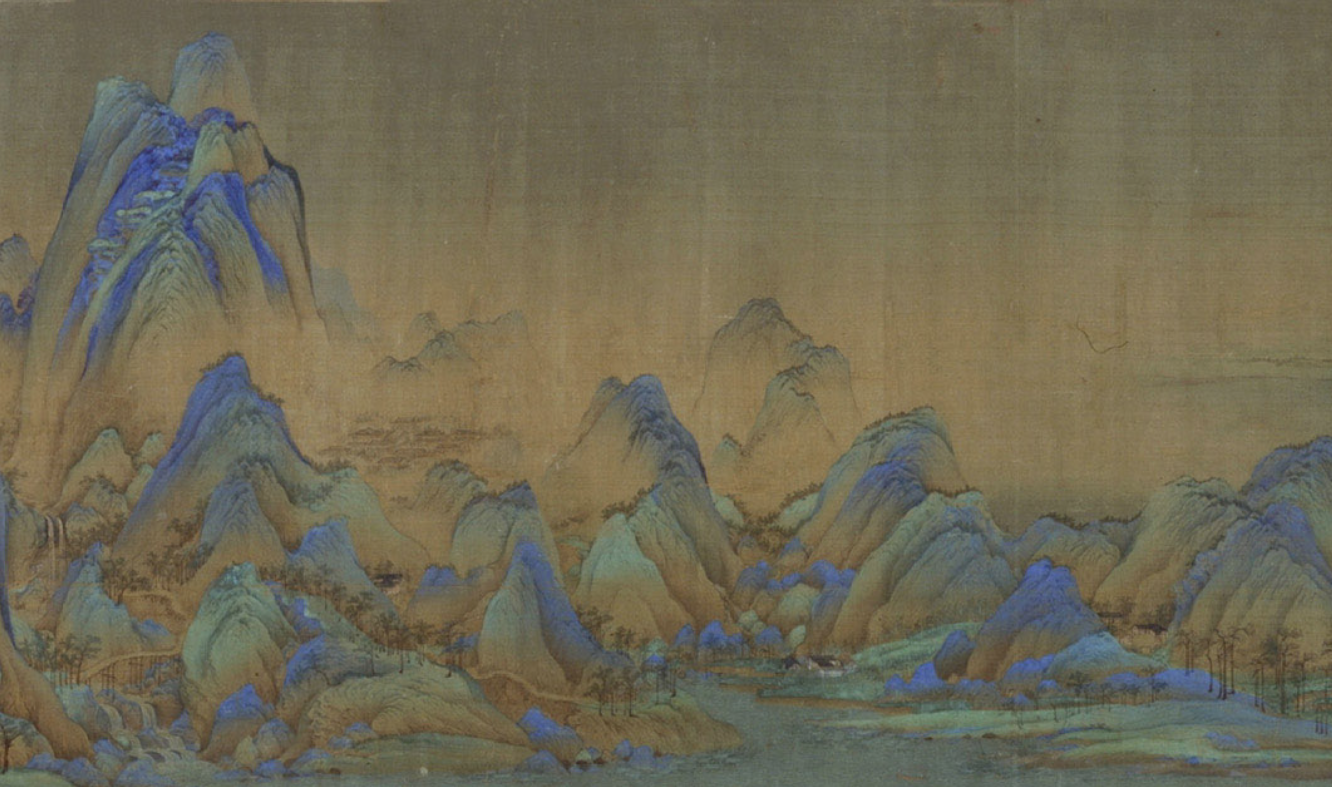王維:The Wang River Cycle 2-下
This is the second half of my discussion of Wang Wei’s Wheel Rim River Cycle, a set of 20 poems idealizing his newly bought estate in the country near the capital Ch’ang-An on the location of modern Xi’An (formerly Hsi An, formerly, obviously, Ch’ang-An). Since this website has shut me out several times, resulting in many hours of work gone down the drain, I decided to print the Chinese characters in the modern way from left to right. Sentence this like something get you then but left to right from them read can you.
——————
11. LAKE YI
欹湖
Ripple Lake
吹蕭凌極浦。日暮送夫君。湖上一迴首。山青卷白雲。
blow pan-flute cross extreme shore / day dusk see-off (husband) master/you / lake upon one turn head / mountain blue/green roll white cloud
Lake Yi Vagary Lake
Blowing flutes cross the distant shore Flute song carries beyond furthest shores.
A day’s dusk I bid farewell to you. In dusk light, I bid you a sage’s farewell.
On the lake, with one turn of the head, Across this lake, in the turn of a head,
Mountain green rolls into white clouds (Polly) mountain greens furl into white cloud. (Dinton)
I like “Flute song carries and sage’s farewell” in Dinton’s version as well as furl. I would give Dinton a good refurl to anyone”. The last line also captures the singular and plural of things better. Oh, and what does “Vagary” mean?
At lake Yi ” Lake I
A flute drifts beyond the lake. We play our flutes as we cross to the far shore
At dayfall I send my friend off. And the sun is setting as I see off my friends
On the waters I turn my head. Turn and look back over the lake -
Green mountains fold up white clouds (Barnstones) White mountains curl on the blue hills. (Mrs. Robinson)
“Yi”, a very common sound with over 100 entries in my big Ricci Chinese-French dictionary and probably more in my Gudai Cidian, is pronounced “ee”, no consonant - it’s one of the many anomalies of the now ubiquitous pinyin system - the one with the Q’s and the X’s and the Zhang Zhou spellings. As you will see in Mrs. Robinson’s entry on the right, the Wade-Giles spelling, better fitted for English, writes “I”. Avoid pronouncing that “I” as in the just graduated Harvard student calling his parents on the phone with “It’s I”.
“At dayfall I send my friend off (Barnstones).” - why didn’t he take the flute out of the water? —— I think the first line of Mrs. Robinson’s translation is too casual. Chinese doesn’t have plural forms; plural needs to be indicated. “Friend” in poetry can be either, so her “my friends’ is legitimate; but isn’t one really good friend much more suggestive and universal? I’m also thinking of the many Chinese poems from this period that are dedicated to one particular friend. Li Bai 李白 and Dufu 杜甫 have composed several such poems honoring each other and their friendship, which may well match other great friendships in history like Goethe and Schiller, Haydn and Mozart, or Trump and Putin, perhaps (or Biden and Neil Kinnock). As for the blue hills: might Mrs. Robinson be from Kentucky…?
Beside Lake Yi At Lake Yi
Where the lake ends, she sits now playing the flute Flute strains at the lake’s edge
At dusk she bade farewell to her husband. At dusk she parted from her husband
Wistfully she stares across the water Now she gazes across the water
Watching a white cloud rolling up the blue mountain side (Woolmsley) at a white cloud against the dark hillside (Bill Keith)
This is fascinating. This is the only translation that picks up on the meaning “husband” of fu jun 夫君. Did fu come to mean husband in modern Chinese only? The problem seems to be that the person turning around must be the one on the lake, that seems clear enough. Also, the “colors rolling into each other” seems to refer to the world as it fades from the traveler’s perspective —— My friend Bill Keith took this interpretation as well. I like the simplicity of his language, it matches the Chinese much better than most.
Lake Yi
flute tones from distant shore
at dusk I say farewell
on the lake, I turn once more
grey hills or clouds, can’t tell
(Ferryman)
——————
12. WILLOW WAVES
柳浪
分行接綺樹。到影入青欹。不學御溝上。春風傷別離。
separate row join/receive satin/fine tree / reverse shadow enter clear wave / not feel imperial moat upon / spring wind injure farewell (separate leave)
Willow Waves Waves of Willow Trees
Separate rows of fine trees next to each other Separate rows of silky willows touch,
Cast their shadows into clear ripples. and reflections merge into clear ripples.
Not like those on the Imperial moat, The scene is not like the palace moat
When the spring wind is wounded by farewells. (Polly) where spring wind aches with departures. (Barnstones)
Willow Waves Waves of Willow
The two rows of perfect trees The swaying branches of the willow row mingle their silken garments in caresses.
Fall reduced in the clear ripples Reflected shadows ripple the clear water.
And do not copy those by the palace moat Be not like those willows weeping on the imperial embankment
where the spring wind sharpens the goodbye. (Robinson) Which saddens people parting in the cold spring wind… (Woolmsley)
“It was customary to break off a piece of willow to give to a departing traveler. Many partings used to take place by the palace moat.” (Mrs. Rob.)
12. Willow Waves
along the banks they grow
reflected in clear ripples
stark willows; not the glow,
on city ponds, that cripples
(Ferryman)
———————
From A Thousand Miles of Rivers and Mountains (千里江山圖), a horizontal landscape scroll by 18-year old Wang Ximeng (王希孟) (1096 - 1119)
13. LUAN CLAN SHALLOWS
欒家瀨
颯颯球雨中。淺淺石溜瀉。跳波自相減。白鷺驚復下。
blast blast autumn rain middle / lightly lightly rock flow pour / jump wave/bead self mutual/each other splash / white egret start again down
Luan Family Shallows The rapids by the Luans’
Brisk gusts in the autumn rain Howl howl autumn wind rain
Rushing on, the stream pours over rocks. Fast fast stream over smooth rocks
leaping waves naturally splash each other, Waves leap ands crash together
White egrets are startled, then descend again. (Yu) White egrets startle, then down again (Mrs. Robinson)
Rill of the House of the Luans Golden Rain Rapids
Blasts of winds amidst autumn rains Wind buffets and blows autumn rain.
Patter-patter upon rocky clod Water cascading thin across rocks,
Jumping beads splash against each other. waves lash at each other. An egret
A white egret - startled - then down (Yip) startles up, white, then settles back. (Dinton)
As per use, Polly has the most direct, Ockamian transatlantic, correction, translation; while Dinton has the most beautiful one. Mrs. Robinson takes the twin words over into the translation. Twin words were used to express the vastness and the universal, ineffable nature of nature. I am not sure they really work the same way in English. I like Yip’s pitter-patter better, with my own improvement, as English twin words tend to be fraternal, not identical: itsy-bitsy, teeter-totter, tell-tale, ping-pong, dingdong, etc. See the Chaos below, who I think may have another questionable image …
At the Rapids of the Luan Family Luan Family Rapids
Under the spatter of the October rain In the windy hiss of autumn rain
The shallow water slides over slippery stones; shallow water fumbles over stones.
Leaping waves strike each other Waves dance and fall on each other:
And frightened, the egret dares not dive for fish (Woolmsley) a white egret startles up, then drops. (the Barnstones)
How does Woolmsly know that the Egret does not dare to dive for fish? The police report says nothing about it, and the lieutenant only learned about that this morning. That means he could only have heard it when he was on the scene of the crime, when the poem was being murdered. —— And ‘drops dead?’, Fred? Just asking… I like the ‘dance’. Though I don’t believe the Barnstones’ version would be very popular among NFL offensive players.
Rapids of Luans Luan Family Shallows
Roaring wind, with gusts of autumn rain, brisk gusts in windy fall
Makes pitter-patter on these rocks and smites wild waters pour and drown
Pebbles with angry beads of splashing water smoothed rocks, a splashy call
The white egret startles, soars, descends, alights (Chaos) white stork flares up - calms down
… Beads of splashing water??? (Ferryman, not totally accurate to the action)
——————
14: GOLD POWDER SPRING
金屑泉
日飲金屑泉。少當千餘歲。翠鳳翔文魑螭。羽節朝玉帝。
day drink Gold Powder Spring / few function-as thousand remnant year/age / blue/green phoenix rise/fly webwork (hornless dragon) / feather knot audition-at-court jade emperor
Gold Powder Spring Gold Dust Spring
Drink each day at Gold Powder Spring Drink daily at Gold Dust Spring, even a little
And you should have a thousand years or more and live a thousand years, and then the car
To soar on an azure phoenix with striped dragons Of the green phoenix drawn by the striped dragon
And with plumes and tassels attend the Jade Emperor’s court. (Polly) With the feather canopy, to the Jade Emperor’s court (Robinson)
“The allusions in this couplet are to the mythical figures of the Queen of the West (Xi wang mu), who was said to have ridden in an azure phoenix chariot pulled by striped animals, and the Jade Emperor, supreme deity in the Taoist pantheon. Gold was believed by Taoists to confer immortality. hence their many alchemical experiments.” (Polly) ——- “There was a myth that a daily drink of powdered gold would confer an exceptionally long and entirely healthy life: this spring was no doubt yellow in colour”. The ‘green phoenix car was that of the Mother of the King of the West (唐納·川普) one of the immortals, and the Jade Emperor, the supreme Diety (拉什·林博) of the popular Taoist pantheon.” (Rob.)
The Stream of Powdered Gold The Stream of Powdered Gold
He who drinks daily from the Stream of Powdered Gold Here, the Chaos again give the Walmsley translation -
Shall live for a thousand years! up to and including the footnote
Then he will be presented to the Jade Emperor,
Riding beneath a plumed canopy in a carriage drawn by soaring blue phoenixes and spirited young dragons ... (Woolmsley)
“The Jade emperor, Yü Huang, was the Taoist Supreme Lord of the physical world and saviour of man” (Walmsl.). —— As for the last line: ‘Roses are red, violets are blue, sunflowers yellow, I bet you thought this was going to be some romantic poetry but no, these are just gardening facts …’
Gold Powder Spring
Gold Powder Spring: a cup
a day, your charm restored
and ride the Phoenix, up
in pomp to Heaven Court
(Ferryman)
——————-
15. White Rock Rapids
白石灘
清淺白石灘。綠蒲向堪把。家住水東西。浣紗明月下。
white rock shoal (I love that English word!)
clear shallow white rock rapids / green Typha Japonica to-face endure grasp / home live water east west / wash silk-tissue clear moon under
White Rock Rapids White-Rock Shallows
Clear & Shallow, White Rock Rapids White-Rock Shallows open and clear,
Green rushes once could be grasped green reeds past prime for harvest:
Families live east & west of the water families come down east and west,
Washing silk beneath the bright moon (Polly) rinse thin silk radiant in moonlight. (Dinton)
White Pebble Shoal White Stone Shallows
White Pebble Shoal is clear and shallow. In the clear White Stone Shallows
You can almost grab the green cattail. Green reeds almost near enough to touch
Houses east and west of the stream. The people on both sides of the river
Someone washes silk in bright moonlight. (Barnstones) Wash their silk here under the shining moon (Mrs. Robinson)
I really like this one by the Barnstones. Probably the ‘someone’. Why is ‘someone’ so much more evocative than ‘people’? Probably because social gatherings only give rise to so much spiritual depth. Loneliness draws you deeper into the sort of contemplation that is so suggestively implied in all these poems.
White Stone Bank 15. White Rock Rapids
White Stone Bank River, shallow, clear green they grow, in bulk
Meanders past a sparse handful of rushes. cattails, a balmy June
Families on the east and the west banks a woman washing silk
Wash silk in the river moonlight. (Walmsley) under a milky moon
Just like three trombonists can walk past a bar, it’s at least possible, Woolmsley can be short and succinct ... (Ferryman)
From A Thousand Miles of Rivers and Mountains (千里江山圖), a horizontal landscape scroll by 18-year old Wang Ximeng (王希孟) (1096 - 1119)
16. NORTHERN HILLOCK
北垞
北垞湖水北。雜樹映朱欄。逶迤南川水。明滅青林端。
north hillock, lake water north / various tree reflect bright-red barrier / to-wind (criss-cross) south river water / bright extinguish/end blue-green forest extreme
Northern Hillock North Hill
Northern Hillock, north of the river’s waters North Hill north of the lake
Various trees vivid against Crimson railings Red balcony bright among various trees
Winding about, the Southern River’s waters Twisting winding the river to the south
Bright and dim to edge the azure forest (Polly) Gleaming vanishing by the edge of the green woods. (Mrs. Robinson)
North Hill
North Hill stands out above the lake again W.’s translation copied on the Gaos’ CD, with a typo:
Against thick evergreens gleams startingly a vermillion gate. ”North Hill stands cut above the lake”
Below, South River zig-zags toward the horizon,
Glistening, here and there, beyond the tree-tops of the blue forest (Walmsley)
North Point East Point
At North point north of these lakewaters, here, there’s no academy
railings flash red through tangled trees. no honors on display
Here, meandering azure-forest horizons, just ivory and ebony
South River shimmers in and out of view (Hinton) bird shit, river clay (Ferry Reno)
Northern Hillock
north bank, stands of trees
vivid against red fences
in the winding waters’ breeze
the deep forest commences
(Ferryman)
—————-
Listening to the Qing, 聽琴圖, detail from a hanging scroll by Song emperor Huizong 宋徽宗, 11th century.
17. Bamboo Lodge
竹里館
獨坐幽篁裏。彈琴復長嘯。深林人不知。明月來相照。
alone sit secluded bamboo inside / play lute again long whistle / deep forest man not know / bright moon come mutual shine
The qin 琴 is one of any number of string instruments. The xiaodíqín 小提琴 (see’yow tea ch’hin) is a violin, and the dàdíqín 大提琴, tah-tea-ch’hin, with a French [t] on ta, both modern words of course. 彈琴 tan qin (t’hun ch’hin) means pluck the instrument, so Wang Wei was (imagining) playing the instrument shown above. The Chinese hammered dulcimer was called the yángqín 扬琴 (young? ch’hin? - question marks indicting tone rather than lack of certainty). The Chinese lute was called pípá, 琵琶 (‘pee?-puh?’). The choice of the word qín however may have been decided by semantic or rhetorical reasons, so as the the precise instrument Wang Wei had in mind, it’s anyone’s guess, except perhaps the the double bass or the contrabassoon. The qín or guqín, 古琴, seems to have been China’s most prominent instrument during the Tang dynasty, like the bass gamba in France around 1700, the violin in many middle European families like my dad’s in the 19th to mid 20th centuries, and the guitar now.
Bamboo Lodge Bamboo Mile Lodge
Alone I sit amid the dark bamboo Alone I sit in dark bamboo,
Play the zither and whistle loud again strumming the lute, whistling away;
Deep in the wood no one knows deep woods that no one knows,
The bright moon comes to shine on me (Polly) where a bright moon comes to shine on me. (Dr. Watson)
1. “This alludes to a poem entitled ‘The Mountain Spirit’ (Shan gui) the ninth of the Nine Songs in the Songs of Chu, There the speaker grieves over the failure of his lady (the spirit) to arrive and he waits in sorrowful solitude in a dense and gloomy bamboo grove. —— 2. A ‘whistle’ (xiao) was probably a combination of Taoist breathing techniques and whistling which was said to express feelings and was associated with harmonizing with nature and achieving immortality (…)” (Polly)
House hidden in the Bamboo Grove Bamboo-Midst Cottage
Sitting alone in the dark bamboo Sitting alone in silent bamboo dark,
I play my lute and whistle along I play a ch’in, setting into breath chants.
Deep in the wood no one knows In these forest depths no one knows
the bright moon is shining on me. (Barnst.) this moon come bathing me in light. (Dinton)
( =”no one knows that the moon is shining on me” - don’t think that is what Wang meant at all) ———— (breath chants: thank you, David - Ch’in: qin in pinyin
The Bamboo hut Bamboo Grove
Sitting among bamboos alone, I sit alone among dark bamboos,
I play the lute and croon carefree. Strum the lute and let loose my voice.
In the deep woods where I’m unknown, Grove so deep, no one knows.
Only the bright moon peeps at me. (X.Y.Z.) The moon visits and shines on me. (Yip)
X.Y.Z is one of the mostly Chinese anthologies that preserve the rhyme in English. I am mystified why a Chinese edition appears unaware of the Taoist practice of 長嘯,‘chant breathing’.
Het tussen bamboes paviljoen Bamboo Grove Cabin
Alleen gezeten tussen de koele bamboes - I sit beneath thick leaves of dark bamboos,
De citer spelend of langdurig fluitend. Strumming my lute, letting my voice ring free.
Diep in het bos, aan mensen onbekend: No one knows I am here in this dense forest
De volle maan komt me beschijnen. (Idema, of course) Except the moon that comes to shine on me (Chaos)
(ik vind de vertalingen van Idema meestal heel mooi - hij kan uitstekend concurreren met de auteurs van het gemakkelijk dertig maal grotere Engelse taalgebied)
Bamboo Grove Bamboo Lodge
Alone in a bamboo grove, amidst these bamboo rows
playing my lute, singing my poems, I play the lute at night
no one knows I am here deep woodlands, no one knows
but the bright moon. (Keith) only the moon’s cold light - (Ferry)
I like singing my poems. Not literally. I like Bill’s use of that phrase in his translation. He probably did not know about the meaning, already discussed, of chéng xiào as a Taoist meditation practice - if that is indeed the right interpretation here.
——————
18. Magnolia Basin
辛夷塢
木末芙蓉花。山中發紅萼。澗戶寂無人。紛紛開且落。
tree tip hibiscus flower / mountain midst set-forth red calyx / mountain-stream hut/home still/silent no man / profuse profuse open then drop
Magnolia bank Magnolia Slope
On the tips of trees lotus (sic) flowers. Lotus flowers on branches’ tips
In the mountains produce red calices. Send vermillion throught the hills
The mouth of the valley is silent without men. - The valley house deserted, no one there -
In all directions they open, then fall. (Polly) Everywhere everywhere they are flowering and falling. (Mrs. Robinson)
“This alludes to the “Xiang River Princess (Xiang Jun), the 3rd of the Nine Songs in the Songs of Chu, in which the shaman-speaker laments the impossibility of meeting with the goddess-love. He compares this with the likelihood of finding wild figs in the water or lotuses on treetops. Here, however, W. turns the factual impossibility into a legitimate metaphor. Magnolia blossoms do indeed resemble lotus flowers growing on tree branches” (Polly) ———- “To emphasize the vivid effect of the flowers, Wang Wei has adopted a line from the Ch’u Tzu (Chuzi) (Elegies of Ch’u), where the notion of lotus flowers growing on trees is illustrative of an impossibility” (Rob.)
Magnolia basin Hsin-I Village (sic)
On branch tips the hibiscus bloom. High on tree tips, the hibiscus.
The mountains show off red calices. In the mountain sets forth red calyxes.
Nobody. A silent cottage in the valley. A home by a stream, quiet. No man.
one by one flowers open, then fall. (Barnstones) It blooms and falls, blooms and falls. (Yip)
Hibiscus Hill Hibiscus Hill
The Blossoms on high hibiscus boughs From high on highest tree-tips bright hibiscus
Fling crimson through the mountains. Showers its petals on the mountain walls.
Families no longer live in this deserted valley Beside the stream stands a long-vacant hut;
Yet after season the hibiscus still blooms in profusion. Woolmsly The vine blooms and falls, blooms and falls. (Chaos)
Magnolia Slope Magnolia Slope
Lotus flowers on branches’ tips Lotus blossoms adrift out among tree tops
Send vermillion throught the hills flaunt crimson calyces among mountains.
- The valley house deserted, no one there - At home besides this stream, quiet, no one
Everywhere everywhere they are flowering and falling. (Mrs. Robinson) here. Scattered. Scattered open and falling (Dinton)
18. Magnolia Basin
hibiscus blossoms daily
coloring the mountains red
lone hut deep in the valley
flowers_open, fall, lay dead
(Ferry)
I missed - as in I failed to achieve - the hibiscus-on-trees anomaly - but not the allusion to wasted talent flowering in solitude. Within the magnificence of nature, the last line alludes to the people that are denied the chance to flourish in the capital and see their talents flourish and wither when no one is around to appreciate, even observe them. Which automatically leads to the great philosophical question of spirit vs. mondane: if a man says something in the forest and there is no woman around to hear him, is he still wrong?
——————
More from Thousand Miles of Rivers and Mountains (千里江山图), a horizontal landscape scroll by 18-year old Wang Ximeng (王希孟) (1096 - 1119)..
19. Lacquer Tree* Garden
漆園
古人非傲吏。自闕經世務。偶寄一微宮。婆娑數株樹
old men not despise civil-servant
self fault (palace gateway?) custom world stuff
chance lodge one puny palace
(grandma? dance? = whirl) number (measure word) tree
Lacquer Tree Garden Lacquer Garden
The ancient man was not a haughty official No proud official, that man in the past
Naturally lacking experience of worldly affairs Incompetent for secular concerns
He happened to lodge in a humble post The small post he achieved only obliged
Among the lifeless, many-branched trees. (Polly) His wandering among some such trees. (Mrs. Robinson)
“This ‘ancient man’ was Zhuangzi, who is said to have served as keeper of the Lacquer Tree Garden (Qiyuan Li) in the state of Meng (Records of the Historian, 63/2143)” - 4: the phrase trnsl. here as ‘lifeless’ (婆娑, ‘poe-swo’) has many meanings but Zao Diancheng believes it alludes to a p. in the biography of Yin Zhongwen († 407): after coming upon an old sophora tree, Yin contemplated it for some time and sighed: ‘This tree is lifeless, with no intention of reviving’ (Jin History 99/2605)” (Polly)
Lacquer Tree Garden
The keeper of the Lacquer Tree Garden was no proud official: the Chaos also use Walmsley
That old sage knew nothing of worldly matters. for the two last poems in the cycle.
When by chance, he received this low-ranking office,
He sauntered about lazily caring for a few gnarled trees! (Walmslsy)
19. Lacquer Tree Garden
not proud - this long gone guest
awkward in world affairs
pursuing an inner quest
between these trees, in prayers
(Ferry)
Footnote
* The Lacquer Tree, ‘Toxicodendrum vernicifluum, formerly known as Rhus verniciflua,’ Lacquer Tree, tree from which lacquer is made, just like the former artist formerly know as Prince was once known as Prince. I have a very expensive Chinese dictionary in which so far found all the Chinese Characters I could not find in my also quite expensive regular dictionary, but everything is in Chinese, and there are many words I don’t understand.
——————
20. Pepper Tree Garden
椒園
桂尊迎帝子。杜若贈佳人。椒獎奠瑤席。欲下雲中君。
(several species of pepper trees) garden
cassia carafe welcome emperor son
(pollia condensata?) (-) bestow beautiful (wo)man
pepperplant - broth libation precious mat
wish down cloud midst you/lord
Pepper Tree Garden Pepper Garden
Cinnamon wine greets the Son of Heaven A cassia cup to welcome the Child of God
Sweet pollia is bestowed on the lovely person Wild herbs to offer to the lovely girl
Pepper broth libations on the jeweled mat Libation of pepper sauce on the jeweled mats
We wish to bring down the Lord within the clouds (Polly) All to draw down the Lord Within the Clouds. (Mrs. Robinson)
4: “This is a spirit to whom the second of the Nine Songs in the Songs of Chu is addressed. The other images in this quatrain also appear frequently throughout this southern anthology.” (Polly) —— “This poem is largely made of small fragments of The Nine Songs, a section of the Elegies of Ch’u. These were songs of shamans trying to induce the descent of various beings. The reason for making this poem in this way must simply be the mention of pepper sauces in the first of the Nine Songs. See Hawkes, p. 36.” (Rob.)
The Pepper Tree Garden Pepper Tree Garden
With a flask of cinnamon wine, we welcome the daughters of Emperor Yao: for the girls of Heaven
To the Beautiful Goddess, we present fragrant grasses sweet pollia, cassia wine
And we greet the prince of the Clouds pepper broth poured, times seven
With a peppery drink and delectable feast (Woolmsley) at the red lacquered shrine (Ferry: '“basically had no idea what to do with this material…”)
“Based on the legend of the Warring States Period (B.C. 481-221), when the speaker, Ch’ü Yüan was a famous poet. The daughters of Emperor Yüan after their death became fairies. The Beautiful Goddess and the Prince of the Clouds: also fairies.” (Walms.)
——————
This ends part two of this trilogy
(Yes, I decided it should be a trilogy. The bonus materials will be in the last section, forthcoming)
LIST OF TRANSLATORS
The Barnstones = Not Fred and Wilma or Barney and Betty, but Tony and Willis Barnstone
Chaos = Gao Jian-yi, on George Gao’s CD Music Link over Centuries: Wang Wei, Toronto 1999
Dinton = David Hinton, The Selected Poems by Wang Wei, 2006. I like his translations more and more, even though they sometimes go a bit south-west - which in this country isn’t really a bad thing …
Polly = Pauline Yu, The Poetry of Wang Wei, Indiana U. Pr., Bloomington IN, 1980. This way Ms. Yu doesn’t have to enter so far down this list. I have consistently given her translations first, because she is my go-to place for checking the meaning of the Chinese. I do not have Burton Watson’s translations of all poems of the cycle.
Mrs. Robinson = (Mr.?) G.W. Robinson, Wang Wei, Poems, Penguin Classics, 1973. The nickname is inspired by Paul Simon and the other guy.
Woolmsley = Chang Yin-nan and Lewis C. Walmsley, Poems by Wang Wei, Charles E. Tuttle Company, 1958. The double [oo] is inspired by Hugh Grant’s pronunciation of Hallmark, even though the good man (Woolmsley) was from Toronto, ON, a city of which a representative of Enterprise rent-a-car’s Ohio Branch (Cleveland) once asked in which state it was.
Dr. Watson = Burton Watson, The Columbia Book of Chinese Poetry, Columbia U. Pr., New York. No need to mention where that nickname came from, though I was tempted to call him Watson Burton, Hungarian style. I am sure that was his real name, and he turned it around so as not to be taken for Richard Burton’s twin brother. No matter what the documents say, those are all falsified, of course, everyone knows that.
Prof. Idema = W.L. Idema, Spiegel van de klassieke Chinese poëzie, Meultenhof, Amsterdam, 1991
X.Y.Z. = Xǚ Yüān Zhōng, 300 Tang poems, Higher Education press, China, 1999
Xu Haixin, Laughing Lost in the Mountains: Poems of Wang Wei, University Pr. of New England
Young = David Young, Five T’ang Poems, Oberlin College Pr., 1990
Yip & Yanneke = Wai-lim Yip, or Yip Wai-lim, Chinese Poetry, An Anthology of Major Modes and Genres, Dule U. Pr., 1997
officially and unofficially unpublished:
Bill Keith = William ? Keith, Toronto
Ferry Reno, Ferryman, Ferry = 渡復興 (Du Fuxing), AKA René Antoine Duchiffre, AKA Johann Sebastian Offenschiffer, AKA Ludwig van Schiffhoven, AKA Gottschalck Schrootkachel (in Starbucks), AKA I, correction, me, correction I anyway (doesn’t as come with the nominative?)
——————
Carousel
Part of A Thousand Miles of Rivers and Mountains (千里江山圖), a horizontal landscape scroll by 18-year old Wang Ximeng (王希孟) (1096 - 1119), uploaded thru the 4.47s (note to myself), to be extended soon.





